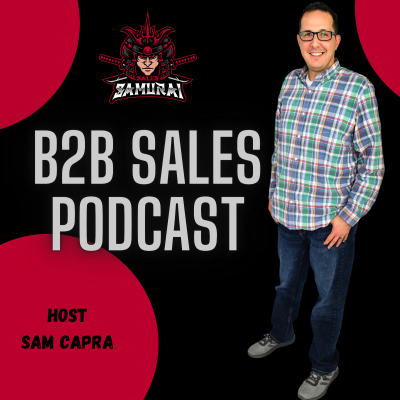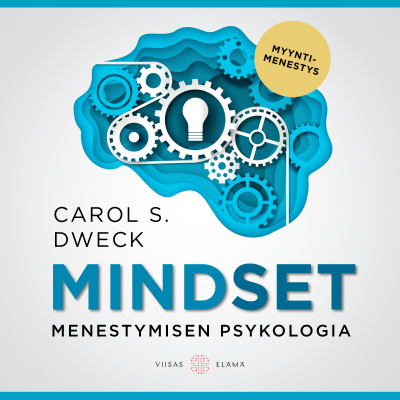
Sales Samurai
Podcast by Sales Samurai
If you are in B2B Sales then this is the podcast for you!
90 vrk ilmainen kokeilu
Kokeilun jälkeen 7,99 € / kuukausi.Peru milloin tahansa.
Kaikki jaksot
25 jaksotIn today’s episode of the ‘Sales Samurai’podcast, host Sam Capra, who helps marketing leaders in the retail space go beyond the sale/transaction, talks with guest Sarah, sharing the best practices to get your team using it and maximizing the solution for them. Episode Highlights * 01:55 – Sarah shares, she started working with a bunch of start-ups and a lot of her role within those start-ups was implementing CRMs and getting them set up with them. * 03:43 – Sam enquires from Sarah if she has a very broad spectrum from a sales perspective, and what made her start in sales. * 05:40 – There's a lot of value in starting at a more established organization, says Sam. * 07:25 – Sam asks Sarah if she is seeing the space getting more crowded in the CRM? * 09:39 – CRM has always been the necessary evil, and that should be the foundational tool of any sales organization, mentions Sam. * 11:00 – There are so many different ways and methods to keep track of your contact information. So finding the right tool for you and your company is important. * 13:04 - Sarah highlights, it's important to think about what is your current process looks like, and what potentially is it going to look like a month or even a year from now? * 14:49 – If you move to a new tool with the same types of processes and behaviors, you probably are going to end up at the same place, says Sarah * 17:25 – It would be great if the flow of data, and where it is coming from can be stored into your CRM, but it doesn't necessarily mean that your team has to be working out of it constantly, it depends on what you need. * 21:40 – Sarah points out that there is a reason why user adoption is lower because the users get overwhelmed by the amount of data that's in there. They don't know what they're supposed to update. * 23:11 – A lot of sales leaders will stick to a field because they think that they need it. * 26:00 – Sarah states, standardization is trying to keep things aligned across the system. * 28:25 – Inefficiencies in redundancies if you don't standardize it leads to that drop off from an adaption and those challenging conversations probably with your sales team, states Sam. * 31:54 – Sarah highlights, regular conversations, and check-ins are also very important because you implement something in one way doesn't mean it's going to stay that way. * 32:22 – A lot of times CRMs are implemented and managed by IT teams or leadership, that's fine, and it's great. However, you do need to have the voice of the everyday user constantly, mentions Sarah. * 34:31 - When you initially roll something out, it's easy to create something, but then it can be hard to remember to go back and update those materials. * 35:41 - If you're going to document that you got to keep up with the documentation to make sure it's up to date. * 37:22 - If everybody is using it, then everybody is going to naturally have that feedback and those types of conversations with each other. * 40:10 - If it's implemented and used correctly, then you can see that in the long term. Three Key Points 1. When you're rolling out initially, there are two buckets, first is, rolling it out initially and making people aware of how to use it, what this tool is, where things go, why it goes there, or what this field is used for. Then the other piece of it is what the feedback loop is? Is it working the right way? Do we need to switch this? What do we need to do here? 2. Sarah says she is always on the side of getting everybody on to the CRM and getting everybody involved and trying to get everybody's workflows built-in there because it's not a sales tool anymore, it's got marketing, it's got support, and it's got social. There are a lot of features that can be built in that are not just sales anymore. So, it's not just for the sales teams. 3. You need to be getting your system into the right place and understanding how to use it and prioritizing what those things are, what is that shiny new feature that you want to do? What is that automation that you want to put in place? What is that integration that you want to set up and prioritizes what those are and then what the timeline looks like? Tweetable Quotes * “These tools are constantly changing. All of them are coming out with new updates, new partnerships, Salesforce and Slack.” – Sarah * “If we can't get this to work for us, we'll just switch to something else and I'm like, you can do that. But typically, it's not the tool. It's the way that you're using it.” – Sarah * “Once you're in a CRM and you've been using it and all that data, it's just not like hey, we're going to switch today. You do have to think strategically.” - Sarah * “What do you want to store on a field level within the CRM because you may want to keep that information in there. But you may not need to store it in a field.” - Sarah * “It's really important to have not only consistent customizations but a consistent understanding of how the system works and what to do with the records.” - Sarah * “When you are implementing it, it's great to have voices from your team or anyone who is going to be using it on a day-to-day basis.” – Sarah * “Training and onboarding are so important, but what exactly it looks like is going to be different for everyone.”- Sarah * If half using it and the other half not so much using it. It's harder to have a collaborative feedback loop.” – Sarah Resources Mentioned * Sam Capra on LinkedIn [https://www.linkedin.com/in/samcapra/] * The Sales Samurai B2B Sales Podcast [https://salessamurai.io/] * Sarah: Twitter LinkedIn Website [https://www.zoho.com/] Follow the Sales Samurai Podcast on Social * Instagram [https://www.instagram.com/salessamurai/] * Twitter [https://twitter.com/salessamuraiio] * Linkedin [https://www.linkedin.com/company/sales-samurai/]
In today’s episode of the ‘Sales Samurai’podcast, host Sam Capra, who helps marketing leaders in the retail space go beyond the sale/transaction, talks with guest, James Buckley, creator of "Saywhatsales", Chief Evangelist & Master of Ceremonies @JB Sales. They're going to be discussing why time management and Omnipresence matter more in 2022 than it ever has. Episode Highlights * 01:55 – Where does "Saywhatsales" come from, enquires Sam. * 04:10 – James shares that the number one thing a salesperson can say is, how do I make people want to talk to me, content that matters to them is the way, James got through all of it. * 08:18 – James’ first sales job was as a Phone Line Salesperson, it was door-to-door B2B in the heat for AT&T. * 10:47 – When you're shaking your head, there's a natural tendency for a buyer to agree more or be a little more agreeable with you, highlights James. * 13:32 – "Saywhatsales" was the long game from day one because James recognizes that from his days of working. * 15:33 – Sam says, time is always been the biggest challenge for him like there's just never enough time. * 16:10 – James points out that there are several factors to consider but time blocking is where you want to start, time blocking is so important. * 19:28 - If you're not managing your time, everything around you is managing your time and then you have zero control over your outcomes. * 20:16 – If there are five people in your general vicinity daily, whether that's in Slack or Office when they bark, they immediately become a priority. That is the way of life and when that happens, you need to be transparent, says James. * 21:50 – James suggests keeping your tasks separate, but ensure you're using the time blocking factor to be able to allocate the time no matter what the task is. * 23:18 - Segmenting the task into two buckets (Revenue Generating and Administrative), they both got to be done. But there's got to be a priority associated with both. * 25:11 – Sam states that if you're finding that there's still not enough time, then start getting up a little earlier or staying a little late or whatever works for you. * 27:10 – There's no time limit on value, it can be as impactful in February as it is in April, value does not have a time limit, mentions James. * 30:47 – Sam enquires from James about ‘Omni Presence’ as to what is it from a context standpoint. * 32:07 – When James says ‘Omni Presence’, he means that once you're on his radar, it is nearly impossible to ignore him. He also explains how he does that. * 35:06 – Don't waste time where you’re not, if you’re not actively posting anything on LinkedIn but you’re doing it on Twitter, you're wasting your time. * 37:28 – James says your CTA matters, ask them for feedback, give them something and say read this part of it because it's relevant to you. Find something that happened at their company and tie it into your value proposition in some way. * 38:06 – What works for one buyer, doesn't necessarily work for every buyer. * 40:22 - If you're creating content on Tik-Tok and somebody that's in your space using SEO using hashtags, using all kinds of ways you can get in their feed and they'll see you and you might have an inbound connection request next day. * 42:40 – The first thing you need to do is, dial into your ICP and the Personas that you want in your pipeline. The more you know those people, the easier it is for you to filter. * 45:55 – James mentions, your energy is what matters, and your energy is what people respond to. Your aura, the thing that you put out there, that's electric. That's what we have to dial into. * 46:17 – James says that his number one strength is that people want to talk to him when they get a video from him. They want to hear him when he speaks to them on the phone. His energy is what pulls them towards the conversation, and that's a secret weapon that you own as a seller. * 48:00 - If you are not your authentic self throughout your entire sales career, you are selling dreams, you are selling wishes and promises, says James Three Key Points 1. There are so many hats that we have to wear, without time blocking on our calendar we have no structure to our day-in and day-out. We've got to be prepared for all cases, we need to be time blocking so that we can make sure that we've allocated the time to accomplish goals. We have to have that timeline, that's where we start. 2. If you have conflicting priorities, and things are important to you that you feel aren't getting done, get up earlier, and get the time to do it. 3. Stop trying to build a relationship with people that just reside above the power line. Start building a relationship with an organization and you're going to find that the people that are living above the power line, you get their attention because you're building a relationship with their organization. If you earn it, it's hard for them to say no to you. Tweetable Quotes * “Most people sales or not, we're just not very good at managing our time.” - James Buckley * “Productivity and time management go hand in hand because time blocking is what you need.” - James Buckley * “No matter what you might have planned, there are at least five people at your company that could hit you on slack at any point and become your priority.” - James Buckley * “Task Management +Time blocking = Successful Time Management” - James Buckley * “I'm a salesperson and my job is to get attention from people that aren't expecting to give me any today.”- James Buckley * “Decision-makers get pissed when people are this way because you're not even providing them any value.” - James Buckley * “Pragmatism is the religion of sales today.” - James Buckley Resources Mentioned * Sam Capra on LinkedIn [https://www.linkedin.com/in/samcapra/] * The Sales Samurai B2B Sales Podcast [https://salessamurai.io/] * James Buckley: Instagram [https://www.instagram.com/saywhatsales/?hl=en] Twitter [https://twitter.com/saywhatsales] LinkedIn [https://www.linkedin.com/in/jamessaywhatsalesbuckley/] * JB Sales [https://jbarrows.com/] Follow the Sales Samurai Podcast on Social * Instagram [https://www.instagram.com/salessamurai/] * Twitter [https://twitter.com/salessamuraiio] * Linkedin [https://www.linkedin.com/company/sales-samurai/]
In today’s episode of the ‘Sales Samurai’podcast, host Sam Capra, who helps marketing leaders in the retail space go beyond the sale/transaction, talks with guest, Steve Richard, Founder @ExecVision: Sales Coaching & Conversation Intelligence Software. Steve's sharing 8 Cold Calling Tactics that have the potential to work for you. Episode Highlights * 03:34 – Steve shares his background, how he didn't make it as an Investment Banker, and so he mimic what better people were doing at the time, which made him better. * 04:20 – Steve realized that sales are about having the ability to impact and influence how people's lives go in some strange way. * 07:25 – If you're not constantly trying new things and testing, experimenting, you're missing the boat, says Steve. * 10:11 – It is about understanding all those different nuances to your business that you should understand and then testing it. * 12:40 - You take a spreadsheet, you put your personas in your rows, you put your industry verticals, and then you fill in the use case and customer story for each of those. * 14:01 – Sam asks, how to leverage a new initiative from a Cold Calling Tactics? * 16:30 – Steve shares, they had clients who over time started comparing people in terms of their experiences, but they outperformed their people. * 20:19 – People are motivated by fixing a problem, accomplishing a goal, or avoiding risks, states Steve. * 23:41 – Steve questions, what about the fact that the seller has more information than ever before? What about the fact that the salesperson could know far more about their prospective customers and prospects than they ever could have before? * 25:40 – Sam asks Steve about his thoughts around the title ‘X’. * 27:00 – Steve discusses where you get to ask your qualification questions, your pain questions, or your goal questions. * 29:30 – Steve points out about second vendor options and their two flavors. * 31:30 - We do coaching and behavior change, tracking manager coaching, calibrating with multiple scorecards, some specific concrete things, reveals Steve. * 34:10 – There are going to be situations that depending on what you sell and who you sell to, don't want to do the second vendor option, they use a certain competitor. * 35:35 – Sometimes with clients, you would hear the same object every time. It was like you literally could predict which objection was going to be before you pick up the phone. * 37:25 – Sam says, let's take 30 minutes to figure out if there's a path forward. * 42:20 - Some solutions have to be seen to be understood. * 43:50 – Steve mentions, in the last 3 to 4 years buyer behavior has changed. * 45:55 – Never say pricing even arranger pricing until you have these 35 fields filled out in Salesforce that's not how the modern buyer will work, highlights Steve. * 47:30 – Sam asks Steve to give some context behind Crawl Walk Run. * 49:01 – Crawl Walk Run makes people feel okay to admit they suck at something. Three Key Points 1. Steve had a sales training company and the clients were telling him that they want the sales training content, but how do you reinforce it? What are you going to do to help reinforce the sales training content? That was the origin of ExecVision, so they started using this in their company and realized that they can reinforce this mastery training. So, it was the marketplace that was asking for this new niche and now they have a new initiative to bring technology to reinforce sales training to a point of mastery. 2. Every time Steve has a scheduled call with someone that he doesn’t know very well. He says, hey, nice meeting you that you have 30 minutes, do a time check, so, we can do this one in two ways. This is a tactic for a scheduled call; you don't do this on a cold call. 50% of the time they say give me more context, show me some stuff. 3. The other thing you got to be as a salesperson, you got to be a person, which means when we hear that someone is doing well with something, do we uncover pain? No, there wasn't anything to uncover. So, just walk away saying I'm happy for you. I'm glad to hear that things are going well. I'm glad to hear you figured it out. This qualified not worth our time. Tweetable Quotes * “Those people at the top of the leaderboard those are my new best friends.” - Steve Richard * “What you sell and who you sell to dictates everything.” - Steve Richard * “Anybody who says, oh, this is the way you should always do it, don't listen to him.” - Steve Richard * “If you're not leveraging and learning from your sales engineers and solutions, consultants or solutions architects or whatever term you use, you're crazy.” - Steve Richard * “Senior executives tend to be more visual than the average people in the population.” - Steve Richard * “If you're in a situation where you're going after a competitive install base, you got to be bold.” - Steve Richard Resources Mentioned * Sam Capra on LinkedIn [https://www.linkedin.com/in/samcapra/] * The Sales Samurai B2B Sales Podcast [https://salessamurai.io/] * Steve Richard: LinkedIn [https://www.linkedin.com/in/saleskickoffspeaker/] Follow the Sales Samurai Podcast on Social * Instagram [https://www.instagram.com/salessamurai/] * Twitter [https://twitter.com/salessamuraiio] * Linkedin [https://www.linkedin.com/company/sales-samurai/]
In today’s episode of the ‘Sales Samurai’podcast, host Sam Capra, who helps marketing leaders in the retail space go beyond the sale/transaction, talks with guest, Larry Levine, best-selling author of ‘Selling from the Heart’. They discuss what ‘Sales Authenticity’ is and how to develop it! Episode Highlights * 01:50 – Larry says, he sold copiers his whole life up and down the street, small businesses, medium businesses, and enterprise major accounts. * 04:28 – It took Larry five to six months for him to make his first sale. * 06:13 – Larry believes that if they do the non-negotiables in the basics and sell well, it creates the foundational layers for how they can go about layering sophisticated stuff. * 10:24 – If you're in those environments that don't align with how you sell to your point, you can either accept it or lean into it, says Larry. * 13:45 - If you want to bring your authentic self to the forefront you have to be willing to do the inner work to uncover what's in your heart. * 17:56 – Larry states that he transformed his career within a period of 10-years when he was around 40 to 50 based on doing the inner work. * 19:20 – In his 40s Larry’s first business coach taught him the inner work and taught him how to replicate himself online. * 24:48 - If you read 20 pages a day, Monday through Friday, and you took the weekend off, you have read two books a month and 24 books in a year. You are now probably in the half percentile worldwide of readers. Imagine the wealth of knowledge you would have as a sales professional to leverage. * 27:16 – Larry states, there is a difference between sales reps and sales professionals. * 30:44 - You want to understand what it means to sell from the heart and lead that kind of lifestyle in sales. Then you got to be willing to do the work. * 32:33 – Sam mentions, to this day, he blocked off his calendar for specific things because it was a best practice that he learned from a book, went to a mentor at the time, and spoke to them about and implemented. * 35:45 – Larry mentions, if you want to become a professional, you got to be willing to do the things that sales professionals do every day. * 37:25 – Sam reveals that he is not looking for 50 different things to pick up from a podcast or a book. He thinks that's another area we miss from a professional standpoint. * 40:03 – If you're looking for mentorship, you should be finding out people older than you somebody who aligns with your values. * 42:50 – Larry Highlights, if you are a reader, take the last three great books you read, look the author up on LinkedIn, ask the person to connect, send them a heartfelt message on the impact the book, add in what you got out of that book, click connect, and watch what happens next. Three Key Points 1. If you want to bring your authentic self to the forefront you have to be willing to do the inner work to uncover what's in your heart, and this is where a lot of people brush it off to the side they go not willing to go there. Larry is going to challenge everybody on this - if you want to become a successful sales professionals who lead with integrity, who's genuine and sincere, you got to connect and relate better to yourself and the more you do it, the better you're going to be able to connect and relate to your clients. 2. Larry highlights that in those 90 days, his coach did two things that transformed his career that he wishes he would have learned in his 20s and 30s. The first one was the road to find out what was in his heart, the inner work. The second thing was how to walk, talk and breathe in an online world. 3. Sales authenticity only can develop who you are and understand who you don't want to be and that is by digesting just an insurmountable amount of information, But if you are reading books and listening to blogs, you quickly start to identify who do you like to listen to, who aligns with how you want to sell and let you keep digesting more of that to develop who you want to be as a sales professional or sales re. Just ramping up your books and authenticity helps you uncover who you want to be and who you should be. Tweetable Quotes * “My secret sauce I found out was my ability to connect and relate to people well.” - Larry Levine * “The more personal I made it. The more I just threw it out there the more I leaned in and asked these types of questions. The responses were just incredible.” – Larry Levine * “Salespeople are products in the environments that they were raised in.” – Larry Levine * “Does the walk match the talk? Does the inner person of who you are, what's inside, does that match what's on the outside?” – Larry Levine * “The more you can connect and relate to yourself, the better you're going to be able to connect and relate to your clients.”- Larry Levine * “You can always transform and reinvent yourself.” – Larry Levine * “In my 50s I’ve learned more about myself bringing selling from the heart to the sales world than I did in my 40s.” – Larry Levine * “There's no excuse of why you can't become better every single day.” – Levine * “Sales professionals do the things that, sales reps find excuses for.” – Larry Levine * “You have to be willing to build a relationship with yourself first.” – Larry Levine * “I got five to six colors in my calendar and I can look at it in any given time and I know based on color, what those activities are.” – Larry Levine * “You got to get control of the calendar.” – Larry Levine * “Pick up a book, find two or three blogs, find two or three influencers that you like, start to calm, search and read their content, set aside have a block on your calendar.” – Larry Levine * “Don't just read sales books, read leadership books, read purpose-driven books, read relationship-driven books.” – Larry Levine * “Surround yourself with people more tenured, and more experienced than you as part of your circle of influence.” - Larry Levine Resources Mentioned * Sam Capra on LinkedIn [https://www.linkedin.com/in/samcapra/] * The Sales Samurai B2B Sales Podcast [https://salessamurai.io/] * Larry Levine: LinkedIn [https://www.linkedin.com/in/larrylevine1992/] Heart.net [https://www.sellingfromtheheart.net/] Follow the Sales Samurai Podcast on Social * Instagram [https://www.instagram.com/salessamurai/] * Twitter [https://twitter.com/salessamuraiio] * Linkedin [https://www.linkedin.com/company/sales-samurai/]
In today’s episode of the ‘Sales Samurai’podcast, host Sam Capra, who helps marketing leaders in the retail space go beyond the sale/transaction, talks with Jeremy Ruch, Founder of ‘Bandalier’. He shares how to interview SDRs who don't have any experience. Episode Highlights * 01:14 – Jeremy mentions, most of the companies they work with would say, it is one of the most risk-prone and one of the hardest hires that they make across the entire organization. * 04:16 – It was kind of the nexus of two things that made him want to start a company to take a shot at the beginning to solve that problem, highlights Jeremy. * 05:15 – Sam enquires, how Jeremy tackles hiring SDRs that don't have the experience like a typical salesperson does? * 07:15 - The first thing is to identify what those traits are, and ensure that those traits are predictive. * 09:35 – Jeremy states that he always recommends starting with a scorecard, especially if you're designing a high-volume recruiting process, seeing how well the scores match up to the performance in the roles knowing that in those first few hires, you're going to make a few mistakes because your scorecard is not going to be perfect. * 13:01 - It's possible to find folks with 6 to 12 months of SDR experience who are killing it in cold calling roles that are new, mentions Jeremy. * 16:10 - It doesn't matter what the scenario is; it's about describing a time where you faced some type of adversity in some way. * 18:11 - If you were answering the resilience question and describing bouncing back from adversity by lying to somebody about a certain thing that would be a red flag, that showcases the lack of integrity, but beyond that, it is pretty linear. * 20:17 – The guest says, they’re trying to build out a matrix where every single person who goes through their interview process will have scores with an overall score, but also scores within each of those sub-areas. * 22:00 – Jeremy explains, how assessment and exercise are as close to the role as possible. * 24:44 – You should be ensuring that your process as closely as possible matches the role that you're going to have these folks in, says Jeremy * 26:34 – Jeremy says they have specific areas where they’re assessing if they took and implemented feedback. That's something they’re certainly going to take note of. * 27:04 - When you're bringing somebody on, why are those first two, or three weeks critical from a validation standpoint, enquires Jeremy. * 29:49 – Jeremy highlights, if you don't have the experience of having done this with hundreds of people, it's tough to know where to set those baseline parameters. * 31:14 – Jeremy shares, they try to make note of all that feedback, and then every six to 12 months they go back to the interview rubric and redo it. * 33:49 – Sam asks Jeremy about a good sampling to start making changes to the rubric. * 35:46 – The most common areas where they see red flags are on the ability to take feedback, and they take this seriously, mentions Jeremy. * 38:37 - There are folks whose default is to push back feedback which becomes an issue. * 41:34 – People with more experience sometimes choose less flattering examples, says Jeremy. Three Key Points 1. Jeremy explains how they tackle hiring SDRs with no experience. For the past four and a half years, they’ve designed an interview process where they’re asking questions designed to get at specific traits. Grading out those questions in a very structured way and then every 6 to 12 months, they go back and look at the predictability of those questions of the traits once they’re on their team, so it’s a two-step process 2. In identifying the traits, themselves, they ask folks to tell them about a time when they exhibited a trait in any scenario and find out the result of that incident. 3. These are the traits that they look for - first, resilience, second is coachability which is the ability to take feedback well, and the third is the baseline communication skills. Tweetable Quotes * “If you haven't done cold calling before, I can't ask you about a time that you are Cold Calling. It doesn't make sense.” – Jeremy Ruch * “I can ask you about times where you have exhibited traits that are predictive of success in these types of roles.” – Jeremy Ruch * “The key is to keep measuring over time, and then go back to the scorecard and say, which questions were productive, and which weren't.” – Jeremy Ruch * “It's not data-driven at all, and we’re trying to insert data into that part of the process.” – Jeremy Ruch * “These roles have a shelf life of 12 to 18 months after which folks are going to be looking to move into management or account executive roles down funnel sales roles.” – Jeremy Ruch * “One key for us is we ask behavioral questions.” - Jeremy Ruch * “The scenarios make absolutely no difference, I don't care what scenario you were in.” - Jeremy Ruch * “The baseline communication skills are less important relative to Resilience and Coachability.” – Jeremy Ruch * “We try to be deliberate about collecting enough examples to learn and change the rubric.” - Jeremy Ruch Resources Mentioned * Sam Capra on LinkedIn [https://www.linkedin.com/in/samcapra/] * The Sales Samurai B2B Sales Podcast [https://salessamurai.io/] * Jeremy Ruch: LinkedIn [https://www.linkedin.com/company/bandalier/posts/?feedView=all] Website [https://www.bandalier.co/] Instagram [https://www.instagram.com/bandalierusa/] Follow the Sales Samurai Podcast on Social * Instagram [https://www.instagram.com/salessamurai/] * Twitter [https://twitter.com/salessamuraiio] * Linkedin [https://www.linkedin.com/company/sales-samurai/]
90 vrk ilmainen kokeilu
Kokeilun jälkeen 7,99 € / kuukausi.Peru milloin tahansa.
Podimon podcastit
Mainoksista vapaa
Maksuttomat podcastit

































